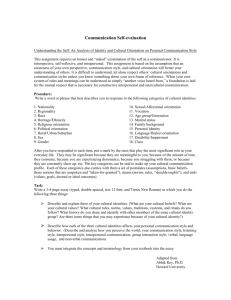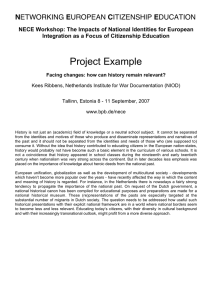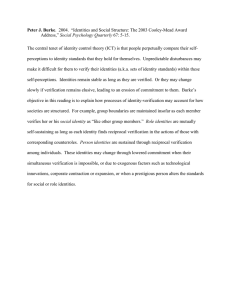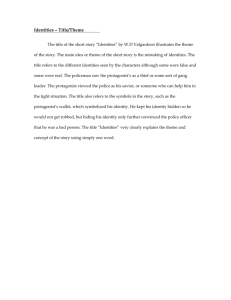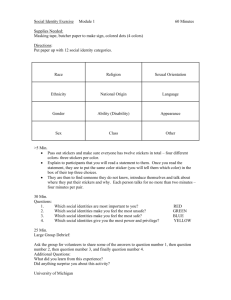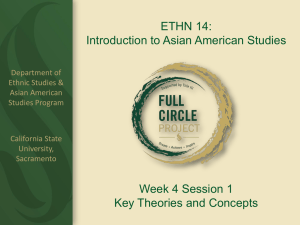Use to propose new general education courses (except writing courses),... gen ed courses and to remove designations for existing gen...
advertisement
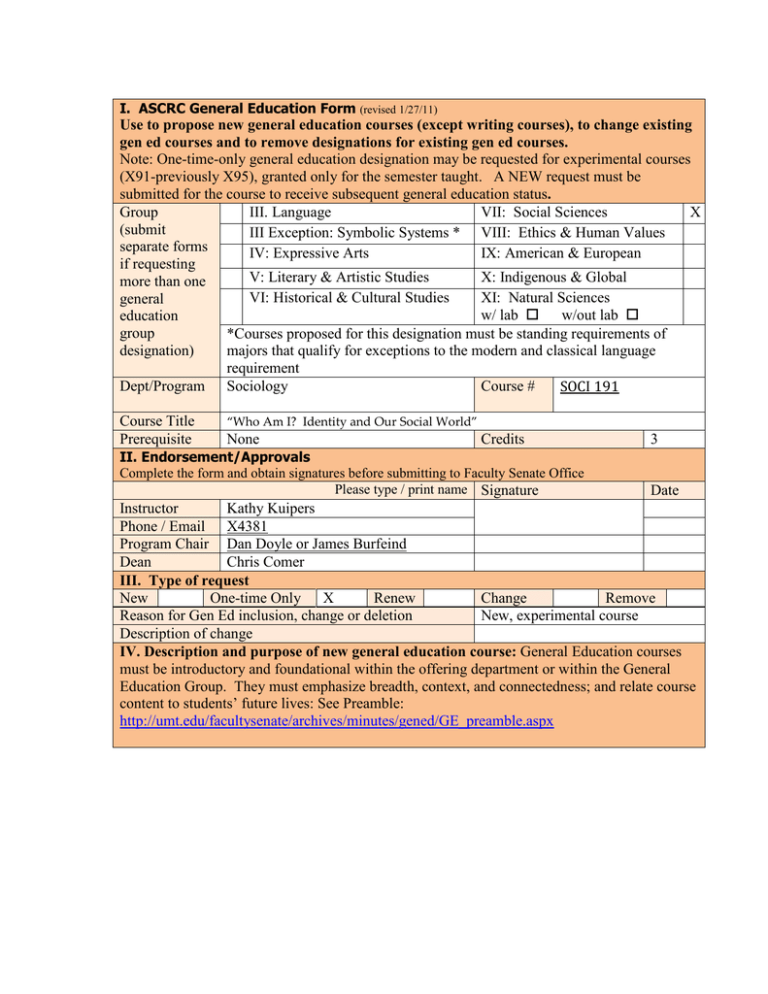
I. ASCRC General Education Form (revised 1/27/11) Use to propose new general education courses (except writing courses), to change existing gen ed courses and to remove designations for existing gen ed courses. Note: One-time-only general education designation may be requested for experimental courses (X91-previously X95), granted only for the semester taught. A NEW request must be submitted for the course to receive subsequent general education status. Group III. Language VII: Social Sciences X (submit III Exception: Symbolic Systems * VIII: Ethics & Human Values separate forms IV: Expressive Arts IX: American & European if requesting V: Literary & Artistic Studies X: Indigenous & Global more than one VI: Historical & Cultural Studies XI: Natural Sciences general w/ lab w/out lab education group *Courses proposed for this designation must be standing requirements of designation) majors that qualify for exceptions to the modern and classical language requirement Dept/Program Sociology Course # SOCI 191 Course Title Prerequisite “Who Am I? Identity and Our Social World” None Credits II. Endorsement/Approvals Complete the form and obtain signatures before submitting to Faculty Senate Office Please type / print name Signature 3 Date Instructor Kathy Kuipers Phone / Email X4381 Program Chair Dan Doyle or James Burfeind Dean Chris Comer III. Type of request New One-time Only X Renew Change Remove Reason for Gen Ed inclusion, change or deletion New, experimental course Description of change IV. Description and purpose of new general education course: General Education courses must be introductory and foundational within the offering department or within the General Education Group. They must emphasize breadth, context, and connectedness; and relate course content to students’ future lives: See Preamble: http://umt.edu/facultysenate/archives/minutes/gened/GE_preamble.aspx Identities are a part of how we see ourselves and influence both our immediate interactions and our perceptions of our social world. What do we mean by identities? Where do they come from? Are they biologically determined or are they socially constructed? Are they static or are they continuously changing? How are they social? Does a person have one identity or many identities? This introductory, interdisciplinary seminar focuses on the topic of personal and social identity and begins by asking some of these questions. Then we take a closer look at how our identities are linked to social groups—families, gender groups, cultural groups, racial and ethnic groups, and occupational groups. Through literature and other cultural artifacts such as art, film, and music, we explore how identities are learned and become salient within social contexts. At the same time, we look at our own, unique conceptions of identity and how we see ourselves. We pose and begin to answer the question for ourselves: Who Am I? In the second part of the course, we look at how we manage our identities. What happens when our identities conflict with one another or are contested by others? Finally, we explore the presentation of our identities: why we show different sides of ourselves in different situations; how our identities influence our ability to engage in social problem solving; and how we articulate and enact our identities globally. This interdisciplinary course will give freshman an opportunity to explore not only what research has to say about identities and identification, but also personal dimensions of who they are, and how their conceptions of themselves are linked to their social world. V. Criteria: Briefly explain how this course meets the criteria for the group. See: http://umt.edu/facultysenate/documents/forms/GE_Criteria5-1-08.aspx This course systematically studies the 1. Systematically study individuals, individual self, how the self is defined within groups, or social institutions. the context of social groups and social institutions and the linkages among them. 2. Analyze individuals, groups, or social We spend time analyzing individuals (the formation of identities in ourselves and problems and structures. others), groups (as a sources for identities and as a context for the presentation of identities), and social problems (and their relationship to the process of identification) Course requirements include a research 3. Give considerable attention to ways paper and a presentation based on primary in which conclusions and interview data, collected and analyzed by generalizations are developed and students. Guidance will be provided to aid justified as well as the methods of data students in drawing conclusions from collection and analysis. qualitative data and in making generalizations about theory from such data. VI. Student Learning Goals: Briefly explain how this course will meet the applicable learning goals. See: http://umt.edu/facultysenate/documents/forms/GE_Criteria5-1-08.aspx 1. Describe the nature, structure, and historical development of human behavior, organizations, social phenomena, and/or relationships. 2. Use theory in explaining these individual, group, or social phenomena. 3. Understand, assess, and evaluate how conclusions and generalizations are justified based on data. Readings will draw on literature from Sociology, Anthropology, Psychology, American Literature, Women’s and Gender Studies, and Native American Studies, explore what research has to say about identities and identification, both on a personal level and within the context of larger social groups. In four written papers (an analysis of theoretical perspectives on identity, a reflexive narration of themselves, a presentation on collective narratives of self-change, and an empirical research paper) and a presentation, students will integrate theoretical material, using theory to examine their own identities, the sources of their identities, how we manage and present our identities, and how identities influence one’s ability to engage in social problem solving. Students will present results from their own data collection project in addition to stories from class speakers and discussions on an online, discussion board. Students will receive clear instructions on how to compile and summarize data, how data are assessed and evaluated, and appropriate conclusions for the data. VII. Justification: Normally, general education courses will not carry pre-requisites, will carry at least 3 credits, and will be numbered at the 100-200 level. If the course has more than one pre-requisite, carries fewer than three credits, or is upper division (numbered above the 200 level), provide rationale for exception(s). VIII. Syllabus: Paste syllabus below or attach and send digital copy with form. ⇓ The syllabus should clearly describe how the above criteria are satisfied. For assistance on syllabus preparation see: http://teaching.berkeley.edu/bgd/syllabus.html See attached. Please note: Approved general education changes will take effect next fall. General education instructors will be expected to provide sample assessment items and corresponding responses to the Assessment Advisory Committee. University of Montana Fall 2012 Who Am I? Identity and Our Social World Sociology 191S Professor: Kathy Kuipers Office: Social Science, room 311 Hours: Tues. (2:15-4), Wed. (1-3), and by appointment Phone: 243-4381 (office); 327-9777 (home, emergencies only) Email: kathy.kuipers@umontana.edu Teaching Assistant: Brent Bluehouse Office: Social Science, room 311 Hours: Thurs. (1:45-3:00), and by appointment Email: brenton.bluehouse@umontana.edu Course Objectives: This course focuses on two key social psychological concepts— identity and identification—and their relationship to behavior. Identities are a part of how we see ourselves and influence both our immediate interactions and our perceptions of our social world. We ask: What do we mean by identities? Where do they come from? Are they biologically determined or are they socially constructed? Are they static or are they continuously changing? How are they social? Does a person have one identity or many identities? This interdisciplinary seminar focuses on the topic of personal and social identity and begins by asking some of these questions. Then we take a closer look at how our identities are linked to social groups—families, gender groups, cultural groups, and racial and ethnic groups. Through literature and other cultural artifacts such as literature, film, and music, we explore the formation of identities within social contexts. At the same time, we look at our own, unique conceptions of identity and how we see ourselves. We pose and begin to answer the question for ourselves: Who Am I? In the second part of the course, we look at the process of identification, how we manage our identities, and how they influence social behavior. We explore the presentation of our identities: how the presentation and perception of identities affect the negotiation of social relationships—particularly inequalities in interaction. We ask why we show different sides of ourselves in different situations; how our identities influence our ability to engage in social problem solving; and how we articulate and enact our identities, globally. Learning Outcomes By the end of this course, students will be able to: • Describe the nature of identity, the process of its formation, and how it is related to larger social structures and social interaction. • Understand the social meaning of identity as a cultural construct and how it is illustrated in the stories we tell. • Use theories from a variety of social science disciplines and perspectives (Sociology, Anthropology, Psychology, Women’s and Gender Studies, and Native American Studies) to explain the concepts of identity and identification as theoretical constructs and show how these concepts are embedded in the social context. • Identify and pursue questions for social science inquiry and conduct ethnographic interviews to gain social scientific information. • Understand, assess, and evaluate research and empirical data on identities and identification by analyzing and presenting results from their own data collection projects; understand the use of generalization in theoretically based research. • • Explore and articulate their own identities as they emerge from and are linked to the social world. Develop analytical and writing abilities appropriate to freshmen. Course Requirements: This is an active participation seminar. While some of the class sessions will be designated for student-led presentations of research topics and research findings, you also are expected to participate in discussions every class session. The readings are designed to help your writing, to emphasize the social science point of view in conducting and writing about research, and to provide a contextual background for an understanding of these topics. You should complete the assigned readings before you come to class to ensure active participation in class discussions and activities. Your class participation will be worth 20% of your final grade. You are responsible for raising questions that you have about the readings or about problems in preparing and writing your assignments and in-class discussions is the best way of doing this. Since class participation, especially in small-group settings, is such an important part of this class, your attendance at all class meetings is mandatory. Class participation, preparation, facilitation, in-class work, and the Moodle discussion board Defining Identity paper Genogram Narrating the Self paper Research Presentation on data collection Group Identities Paper Identities in the Global World final paper TOTAL 20% 10% 15% 10% 15% 15% 15% 100% You are responsible for four 3Written work is worth 65% of your final grade. 6 page papers. You will receive clear guidelines for the structure of the papers several weeks before they are due. You also will create a genogram of your family and summarize what you have done. NO LATE ASSIGNMENTS WILL BE ACCEPTED. A presentation summarizing the results of the data collection research will be worth 15% of your final grade. Grades for this course will include +/- grading. Additionally, if this course is taken to fulfill a Gen Ed requirement, it must be taken for a traditional letter grade Readings: Four books are required as primary texts for the class and available from the bookstore. 1. After Pomp and Circumstance: High School Reunion as an Autobiographical Occasion, by Vered Vinitzky-Seroussi. 1998. Chicago: University of Chicago Press (referred to as APC in course schedule). 2. Winter Wheat, by Mildred Walker. 4th edition. 1992. Nebraska: Bison Books (referred to as WW in course schedule). 3. Winter in the Blood, by James Welch. 1974. New York: Penguin Books (referred to as WIB in course schedule). 4. The Buddha in the Attic, by Julie Otsuka. 2012. New York: Anchor Books (referred to as BA in course schedule). Additional readings (book selections, articles, etc.) also are required and will be available on Moodle. Books also will be put on reserve when/if available. WRITING CENTER We strongly encourage all students to consult with the Writing Center as you work through your assignments. Note that the Writing Center does not edit or correct papers, but helps students plan and execute papers in one or more tutoring sessions. Appointments can be scheduled online at http://www.umt.edu/writingcenter/. Note that for your "Identities in a Global World" paper, you will be required to complete at least one consultation with writing center staff and have the writing center staff complete a certificate indicating that you have consulted with him or her. A few words about plagiarism and academic dishonesty: “Plagiarism is the representing of another’s work as one’s own. It is a particularly intolerable offense in the academic community and is strictly forbidden. Students who plagiarize may fail the course and may be remanded to Academic Court for possible suspension or expulsion.” (taken from the Student Conduct Code, available for review on-line at http://life.umt.edu/VPSA/name/StudentConductCode.) Plagiarism includes: • Copying from another’s paper or allowing another to copy from one’s own paper • Unpermitted collaboration • Giving or receiving unpermitted aid on a take-home examination or paper. Make sure that your work is your own. In this class, discussion of ideas among students is not only permitted, but encouraged among classmates. Giving and accepting comments on each other’s writing is also allowed. Neither using another student’s paper as a template for your own nor coping from any written documents (without giving proper credit) are acceptable. Be careful. Course Schedule: Each of the following sections is arranged according to specific topics to be covered in the course. Topics and required readings for each section are listed for each week. Our progress through the list may change as we spend more or less time on any particular topic. It is your responsibility to keep up with the readings as we move through the course. Tentative Class Outline (subject to change) WEEK AND TOPIC Week 1 Introduction and Orientation READINGS AND FILMS DUE Weekly assignments and groups Citation workshop; using the discussion board and Moodle Citation Handout Read: Lovaglia, Michael J. 2000. Knowing People: The Personal Use of Social Psychology. Boston, McGraw-Hill, Chpts. 2 and 3 (on Moodle). Week 2 Defining Identity: What is the self-concept and how is it related to identities? Read: APC, “Introduction” and Chpts. 1-3. Chicago: University of Chicago Press. Read: Garroutte, Eva Marie. 2003. Real Indians: Identity and the Survival of Native America. Berkeley: University of California Press. Chpts. 4 and 5 (on Moodle). ASSIGNMENTS Do: Personal Empowerment Through SelfAwareness: PETSA (http://www.umt.ed u/petsa/) Moodle 101 (http://umonline.um t.edu/) Week 3 Self-Categorization: types of identities (race, gender, occupation, education, birthplace, roles, etc.) Information literacy: A Visit with our librarian and with the director of the Writing Center. Academic Writing: A Visit from the Writing Center Staff Week 4 Where do Identities Come From? Identity and Place Socialization and learning of identities Week 5 Where do Identities Come From? Family and Peers Week 6 What are Your Identities? Constructing a Genogram Where do Identities Come From? Ancestors and Family Week 7 How do we decide which identities are most important? Identities within context Presentation of Identities Read: Poetry Selections: Greene, Kuipers, Turner, Laux, Forche, Corso, Addonizio (reflexive identity, military identity, Western identity, family identity, Native American identity) Read: WW, pp. 1-48. Twenty Statements Test Write a poem exercise Read: WW, pp. 49-88. Read: WW, pp. 89-142. Read: WIB, Part 1 Read: WIB, Part 2 Genogram Handouts Read: WIB, Parts 3-4 and "Epilogue" Read O'Brien, Tim. The Things They Carried, selections (on Moodle) Read: APC, Chpts. 4-6. (optional) Assignment #1— Definitions of Identity and How We Recognize Them Paper Due (Thursday, September 20, in class) Listen: music on Moodle (Girltalk, etc.) What does it tell you about who you are? Find music exercise Assignment #2— Genogram Assignment Due (Tuesday, October 9, in class) Week 8 Week 9 Multiple and Conflicting Identities/ Identities that Come with and from a Historical Legacy/ Imposed Identities Negotiating Identity and Identity Management: What do we reveal about ourselves? Week 10 Begin data collection: ethnographic interviews Discussion of Final Proposal presentation Week 11 NO CLASS ON TUESDAY, ELECTION DAY: VOTE! Discussion of Final Proposal presentation Read: Turkle, S. 1995. Life on the screen: Identity in the Age of the Internet. New York: Touchstone (selections on Moodle) Read: APC, Chpts. 7, 8, and Conclusion. Read: Root, Maria. "Resolving 'Other' Status: Identity Development of Biracial Individuals (on Moodle) View at least one of the following films: Left by the Ship; Hell and Back Again; Up Heartbreak Hill, Daughter from Danang: http://www.pbs.org/independe ntlens/hell-and-back-again/ http://www.pbs.org/independe ntlens/left-by-the-ship/ http://www.pbs.org/pov/uphea rtbreakhill/full.php?ref=povhp c2 http://www.youtube.com/watch ?v=2ueTwnMb8dI Read: Spradley, James. The Ethnographic Interview, selections on informants (on Moodle) Read: Spradley, James. The Ethnographic Interview, selections on interviewing and questions (on Moodle) Read: Snow, David and Leon Anderson. 1993. “Salvaging the Self” (on Moodle) Read: “Japanese American Families” by Dana Takagi (on Moodle); Read: BA, "Come, Japanese!" and "First Night" Assignment #3-Narrating the Self Paper Due (Tuesday, October 23, in class) Discuss Your Proposed Data Collection ASA Code of Ethics: http://www.a sanet.org/page.ww?se ction=Ethics&name=E thics Begin data collection/ethnograp hic interviews Week 12 View film, "A Family Gathering" (link on Moodle) Read: BA, "Whites," "Babies," and "The Children" Week 13 Read: BA, "Traitors," and "Last Day" NO CLASS THURSDAY: HAPPY THANKSGIVING Week 14 Week 15 Final Assignment #4-Presentations Due (Tuesday and Thursday, November 13 and 15, in class) Read: BA, "A Disappearance" Assignment #5— View website: "Define American" Group Identity Paper http://www.defineamerican.com Due (Tuesday, / November 27, in http://www.huffingtonpost.com class) /jose-antonio-vargas/joseantonio-vargas-meaning-ofamerican_b_1647894.html Read: human rights poetry selections View film: Citizen USA: a 50 state road trip http://www.hbo.com/documentar s/citizen-usa-a-50-state-roadtrip/synopsis.html Global Identity Paper Due, (December 11, by 10:10, am at the scheduled time of our final exam.)
